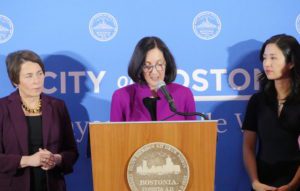Who is a member?
Our members are the local governments of Massachusetts and their elected and appointed leadership.

MMA President and Newton Mayor Ruthanne Fuller speaks at the announcement of $525 million in opioid manufacturer settlement funds for the state. Pictured are (l-r) Attorney General Maura Healey, Fuller and Boston Mayor Michelle Wu.
Attorney General Maura Healey yesterday joined municipal and health care leaders from across the state, as well as families harmed by the opioid epidemic, to celebrate $525 million in funds that have been secured for prevention, harm reduction, treatment and recovery programs throughout Massachusetts.
As part of a $26 billion nationwide resolution with the nation’s largest manufacturers and marketers of opioids, municipalities across the country were eligible to sign-on to receive settlement funds to abate the crisis in their communities.
Healey announced that, because of widespread support from cities and towns, Massachusetts will receive the maximum amount under the settlements. In addition, as the result of an agreement secured by her office, all of the funds will go toward abatement resources for communities and families to address the devastating impact of the opioid crisis throughout the state.
More than $525 million will be coming into Massachusetts over the next 18 years, starting this spring. Of that, more than $210 million will be distributed directly to Massachusetts municipalities, and more than $310 million will go into the statewide Opioid Recovery and Remediation Fund to ensure that funds are spent on harm reduction, treatment and prevention.
“Massachusetts led the nation in taking on the opioid industry, and we will lead the nation in delivering prevention, harm reduction, treatment and recovery,” Healey said. “Cities and towns across our state worked together to secure more than half a billion dollars, and we are committed to using every dollar to provide the services that families need.”
At yesterday’s event, Amesbury Mayor Kassandra Gove was among the local leaders acknowledging the impact of opioids in their community.
“Amesbury is no stranger to the opioid crisis, with nearly a dozen deaths in the last year due to opioid drugs,” Gove said. “It has impacted our families and our neighborhoods, from how people care for their physical and mental health to how our teachers support and provide for our students in classrooms.”
She said the settlement funding “will allow us to directly support and positively impact residents who need it and create proactive programming to ease the opioid crisis.”
Boston Mayor Michelle Wu said her administration will be “working closely with public health experts and the recovery community to ensure every dollar of this funding delivers impact.”
Newton Mayor Ruthanne Fuller, who serves as president of the MMA, said, “These funds give hope to thousands and thousands of people. They’re going to fortify the community-based programs that will meet people where they are. These funds will save lives.”
Gardner Mayor Michael Nicholson thanked Healey and her team “for holding those who got us to this point accountable and for their continued efforts to assist those struggling with the disease of addiction.”
Salem Mayor Kim Driscoll said the settlement “will enable us to invest more in overdose prevention and treatment, public education, and other initiatives aimed at reducing addiction to opioids and caring for those who are suffering from this crisis.”
The settlements are the result of an investigation that found that three major opioid distributors — Cardinal, McKesson, and AmerisourceBergen — shipped thousands of suspicious orders without regard for their legitimacy, and that Johnson & Johnson misled patients and doctors about their addictive nature.
From 2023 through 2038, the payments are expected annually, in July.
For more information on the statewide opioid settlements, visit the AG’s Office FAQ page.